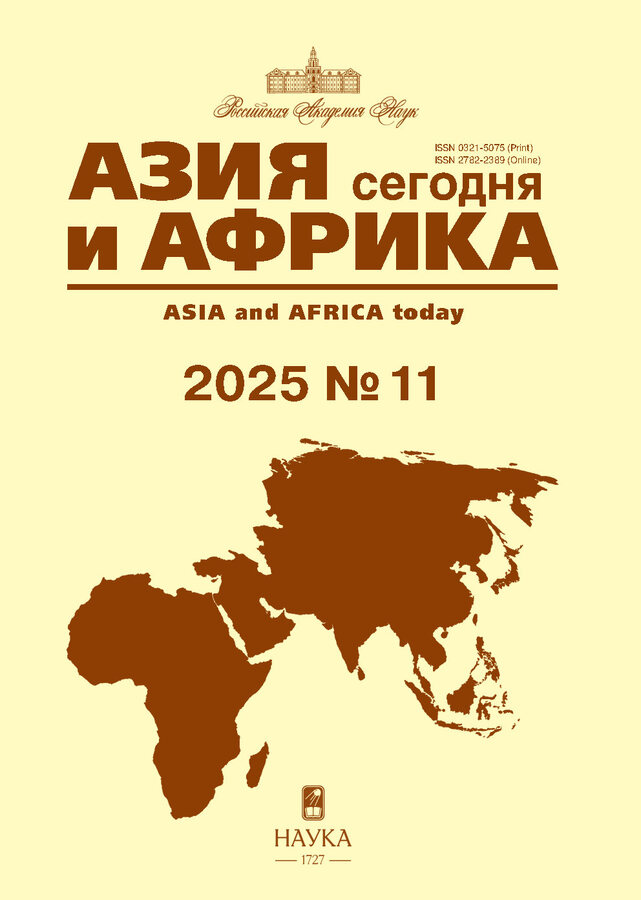Water Scarcity as a Catalyst of Conflict and Transformation in Sudan's Regional Politics
- Authors: Denisova T.S1, Kostelyanets S.V1
-
Affiliations:
- Institute for African Studies, Russian Academy of Sciences
- Issue: No 11 (2025)
- Pages: 24-34
- Section: Politics, economics
- URL: https://journals.eco-vector.com/0321-5075/article/view/696464
- DOI: https://doi.org/10.31857/S0321507525110032
- ID: 696464
Cite item
Abstract
Freshwater scarcity, exacerbated by global climate change, poses major challenges for many African countries. Amid socio-economic and political instability, water crises acquire conflict potential, influencing economic development trajectories and, in some cases, the formation of foreign policy. This is particularly relevant for states within major transboundary river basins, where water access is vital for populations. The article examines the characteristics of water resources and their role in the political and economic development of the Republic of the Sudan, which has experienced protracted conflicts since gaining independence in 1956, partly fueled by resource competition. It also analyses the evolution of the Sudanese authorities' stance regarding water allocation mechanisms for the Nile – Africa's largest river – among basin countries, and concerning the construction of the Grand Ethiopian Renaissance Dam (GERD). This unfinished project has the potential to reshape the geopolitical landscape of Northeast Africa.
About the authors
T. S Denisova
Institute for African Studies, Russian Academy of Sciences
Email: tschen@hotmail.com
ORCID iD: 0000-0001-6321-3503
PhD (History), Leading Researcher, Head, Centre for the Study of Africa South of Sahara Moscow, Russia
S. V Kostelyanets
Institute for African Studies, Russian Academy of Sciences
Email: sergey.kostelyanyets@gmail.com
ORCID iD: 0000-0002-9983-9994
PhD (Political Science), Leading Researcher, Head, Centre for Sociological and Political Sciences Studies Moscow, Russia
References
- Homer-Dixon T. F. 2010. Environment, scarcity, and violence. Princeton: Princeton University Press. doi: 10.1515/9781400836166
- Gleick P.H. 1993. Water and Conflict: Fresh Water Resources and International Security. International Security. Vol. 18. № 1. Pp. 79–112. doi: 10.2307/2539033
- Uitto J.I., Wolf A.T. 2002. Water Wars? Geographical Perspectives: Introduction. Geographical Journal. Vol. 168. № 4. Pp. 289–292. doi: 10.1111/j.0016-7398.2002.00056.x
- Wolf A.T. 1998. Conflict and Cooperation Along International Waterways. Water Policy. Vol. 1. № 2. Pp. 251–265. doi: 10.1016/S1366-7017(98)00019-1
- Zeitoun M., Warner J. 2006. Hydro-Hegemony – a Framework for Analysis of Trans-Boundary Water Conflicts. Water Policy. Vol. 8. № 5. Pp. 435–460. doi: 10.2166/wp.2006.054
- Wheatley M.C. 2024. Water Scarcity and Social Conflict: A Review. Premier Journal of Environmental Science. Vol. 1. № 100006. doi: 10.70389/PJES.100006
- Alzubair M.A.H.A. 2020. Geographical and Hydrological Effects of Nubian Sandstone Formations on Ground Water in Khartoum State – Sudan. International Journal of Hydrology. Vol. 4. № 6. Pp. 270–279.
- Abdelmawla M. 2017. Water Poverty and its Impact on Income Poverty and Health Status in Sudan: The Case of Gezira State (1993–2013). International Journal of African Development. Vol. 4. № 2. Pp. 99–109.
- Omer A.M. 2013. Sustainable Water Resources Management, Future Demands and Adaptation Strategies in Sudan. Global Journal of Human Social Science. Vol. 13. № 3. Pp. 12–29.
- Grishina N. 2022. Environmental Aspects of the State of African Coastal Territories. Journal of the Institute for African Studies. № 3. Pp. 110–118. (In Russ.). doi: 10.31132/2412-5717-2022-60-3-110-118
- Adam A.B., Elamin A.W.M., Hamid A.M.N. 2017. Effect of Management Practices on Water Use Efficiency of Gezira Irrigated Scheme – Sudan. International Research Journal of Agricultural Science and Soil Science. Vol. 7. № 3. Pp. 40–45. doi: 10.14303/irjas.2017.058
- Moorehead A. 1960. The White Nile. Harmondsworth: Penguin Books.
- EI Zain M. 2008. People's Encroachment onto Sudan's Nile Banks and its impact on Egypt. In: Pachova N.I., Nakayama M., Jansky L. (eds.). International Water Security: Domestic Threats and Opportunities. Tokyo, N.Y., Paris: United Nations University Press. Pp. 129–160.
- Kostelyanets S.V. 2014. Darfur: a History of the Conflict. Moscow. (In Russ.)
- Rutten M., Dietz T., Seuren G., Veldkamp F. 2014. Water Dynamics in the Seven African Countries of Dutch Policy Focus: Benin, Ghana, Kenya, Mali, Mozambique, Rwanda, South Sudan. Leiden: African Studies Centre. https://aquaforall.org/viawater/files/asc_water_south_sudan_3.pdf (accessed 29.03.2025)
- Lamberts E. 2009. The Effects of Jonglei Canal Operation Scenarios on the Sudd Swamps in Southern Sudan. Master's thesis. Enschede: University of Twente. https://essay.utwente.nl/59163/1/scriptie_E_Lamberts.pdf (accessed 29.03.2025)
- Salman S.M.A. 2010. Water Resources in the Sudan North-South Peace Process: Past Experience and Future Trends. African Yearbook of International Law Online. Vol. 16. № 1. Pp. 299–328. doi: 10.1163/22116176-90000056
- Salman S.M.A. 2011. The New State of South Sudan and the Hydro-Politics of the Nile Basin. Water International. Vol. 36. № 2. Pp. 154–166. doi: 10.1080/02508060.2011.557997
- De Falco S., Fiorentino G. 2022. The GERD Dam in the Water Dispute Between Ethiopia, Sudan and Egypt. A Scenario Analysis in an Ecosystem Approach Between Physical and Geopolitical Geography. AIMS Geosciences. Vol. 8. № 2. Pp. 233–253.
- Khalifa M., Woods N.E., Eltahir E.A.B. 2023. Estimates of Sudan's historical water withdrawals from the Nile. Journal of Hydrology. Vol. 624. № 129858. Pp. 1–14. doi: 10.1016/j.jhydrol.2023.129858
- Volkov S.N. 2024. The Problem of the Shortage of Fresh Water in Egypt and the Possibilities of Its Solution. Asia and Africa today. № 9. Pp. 21–29. (In Russ.). doi: 10.31857/S0321507524090034
- Water Politics. How Sudan's Turbulent Transition toward Democracy Has Led It to Compromise Its Own Well-Being over the Grand Ethiopian Renaissance Dam. IAI Papers. Vol. 22. № 30. Pp. 1–17. https://hidropolitikakademi.org/uploads/editor/images/Water_Politics_How_Sudans_Turbulent_Tran.pdf (accessed 29.03.2025)
- Mezentsev S.V., Kopytsev I.S. 2025. Two Years after the Tigray Conflict: Political Consequences for Ethiopia. Asia and Africa today. № 5. Pp. 45–53. (In Russ.). doi: 10.31857/S0321507525050055
- Donelli F. 2022. The Al-Fashaga Dispute: A Powder Keg in the Heart of the Horn of Africa. Trends Research and Advisory. Vol. 4. https://trendsresearch.org/insight/the-al-fashaga-dispute-a-powder-keg-in-the-heart-of-the-horn-of-africa (accessed 29.03.2025)
Supplementary files











